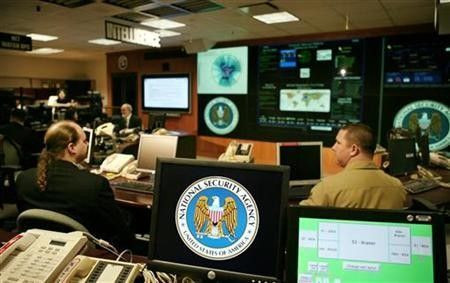Preventing The Next Snowden: NSA To 'Continuously Evaluate' Contractors As Potential Threats

Hoping to prevent any further government leaks like those by NSA whistleblower Edward Snowden, the House Permanent Select Committee on Intelligence (HPSCI) has proposed that U.S. intelligence agencies “continuously evaluate” employees and contractors’ status as potential threats.
According to the Federation of American Scientists’ Secrecy News blog, the House committee made its proposal in a Monday report on the FY 2014 intelligence authorization bill, arguing that constant background checks of NSA contractors would have prevented this summer’s leaks by Edward Snowden. The HPSCI would require all agencies such as the NSA, FBI and CIA to “continuously determine whether their employees and contractors are eligible for access to classified information” by scanning transactions, social media and other lawfully-obtained information.
“Continuous evaluation allows the IC to take advantage of lawfully available government and public information to detect warning signals that the current system of five-year periodic reinvestigation misses,” the HPSCI report stated.
Currently, persons with Top Secret government clearances are given background checks and clearance tests every five years, while those with Secret clearances are given the same every ten years. Under the new proposals from the HPSCI, those with government clearance would be subject to continuous automatic evaluation of foreign travel records, foreign contacts, criminal background checks, credit checks and other publicly available information.
The evaluations would apply to any intelligence employee or “contractor to an element of the intelligence community with access to a classified network or classified information.” Those that the systems find untrustworthy will be reviewed and could possibly lose their security credentials.
Dubbed CE, this continuous evaluation “allows for a review at any time of an individual with eligibility or access to classified information or in a sensitive position to ensure that that individual continues to meet the requirements for eligibility,” claimed Brian Prioletti of ODNI National Counterintelligence Executive at a November 13 hearing of the House Homeland Security Committee.
“As envisioned in the reformed security clearance process, [continuous evaluation] includes automated record checks of commercial databases, government databases, and other information lawfully available,” Prioletti said at the hearing. “Manual checks are inefficient and resource-intensive. The C.E. initiative currently under development will enable us to more reliably determine an individual’s eligibility to hold a security clearance or a sensitive position on an ongoing basis.”
At the same Committee meeting, chief Department of Homeland Security officer Gregory Marshall claimed that continuous evaluation is only the first step towards a state called continuous monitoring. Marshall claims continuous monitoring “will incorporate and analyze data in near-real time from a much broader set of sources.”
The process of continuous monitoring will be aimed not only at ensuring that an intelligence contractor is eligible for security clearance, but identifying employees and contractors deemed an Internal Threat, i.e. an employee like Edward Snowden who may leak classified information to the press. Continuous monitoring “focuses on monitoring certain IT systems and incorporates analysis and collation software to aid in the identification of behavioral trends that could that could be indicative of an insider threat problem,” Marshall said.
© Copyright IBTimes 2025. All rights reserved.






















